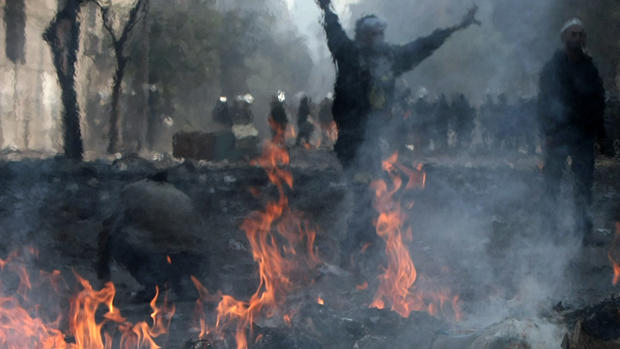Egypt military speeds up transfer of power
Updated 1:45 p.m. ET
CAIRO - Egypt's military ruler says the armed forces are prepared to hold a referendum on immediately transferring power to a civilian authority if people demand it through a referendum.
Field Marshal Hussein Tantawi also told the nation in a televised address Tuesday that presidential elections will be held before June 30, but did not specifically mention a date for the transfer of power.
Earlier, the ruling military council met with civilian political leaders, vowing to relinquish power by July and form a new Cabinet. Aboul-Ela Madi and Mohammed Selim el-Awa, two politicians who attended the five-hour crisis meeting said the generals accepted the resignation of Prime Minister Essam Sharaf's government and will form a "national salvation" Cabinet to replace it.
The July scenario would be a compromise. Protesters had sought new presidential elections by April, but under the military's existing timetable it would continue to rule until late 2012 or early 2013.
But the major concessions were immediately rejected by tens of thousands of protesters in Cairo's iconic Tahrir Square threatening a "second revolution."
Egypt protests enter day 4 with a rally cry
"We are not leaving, he leaves," chanted the protesters, demanding that military ruler Field Marshal Hussein Tantawi and his council of generals immediately give up power to a civilian transitional authority. "The people want to bring down the field marshal," they shouted in scenes starkly reminiscent of the uprising that ousted Hosni Mubarak nine months ago.
In his brief address, Tantawi sought to cast the military as the nation's foremost patriots and angrily denounced what he called attempts to taint its reputation.
Tens of thousands of protesters gathered in Cairo's Tahrir Square immediately rejected Tantawi's proposal with chants of "erhal," or leave.
The military's concession came less than a week before the first parliamentary election since the ouster nine months ago of longtime authoritarian ruler Mubarak. The elections are staggered over three months.
Mubarak was ousted in February following nearly three weeks of sometimes violent protests and ending a 20-year rule. Egyptians celebrated but have grown frustrated with the country's military -- once an ally against Mubarak -- which is leading the country on an interim basis ahead of free elections.
The protesters are suspicious of the military's willingness to give up power, and see harsh police crackdowns as an echo of Mubarak's rule.
"Our demands are clear. We want the military council to step down and hand over authority to a national salvation government with full authority," said Khaled El-Sayed, a member of the Youth Revolution Coalition and a candidate in the upcoming parliamentary election. The commander of the Military Police and the Interior Minister, who is in charge of the police, must be tried for the "horrific crimes" of the past few days, he added.
"This is the maximum we can reach. The (Tahrir) square is something and the politics is something else," Madi told The Associated Press in a telephone interview. He and Al-Awa were among 12 political party representatives and presidential hopefuls who attended the meeting with the military council. Not all parties were represented.
Madi and el-Awa also said the military agreed to release all protesters detained since Saturday and to put on trial police and army officers responsible for protesters' deaths. Nearly 30 protesters have been killed since Saturday.
Complete coverage: Anger in the Arab World
Cairo clashes rage on, 24 people killed
11 protesters killed in Egypt clash
In his speech, Tantawi offered condolences to the families of those killed in the past few days.
Meanwhile, three American students at the American University of Cairo, which sits on Tahrir Square, were arrested outside the university's campus Monday night, the AUC said.
A university spokeswoman identified the students as Luke Gates, 21, an exchange student from Bloomington, Ind. who attends Indiana University; and Gregory Porter, 19, of Glenside, Penn., who attends Drexel University. The third student was separately identified as Derrik Sweeney, who attends Georgetown University.
All three U.S. universities released statements acknowledging the situation and saying they were working with the U.S. embassy in Cairo to see the students returned home safely.
An Egyptian Interior Ministry official said the three were arrested while on the roof of one of the university's buildings throwing firebombs at security forces who were fighting protesters in Tahrir Square.
The official spoke on condition of anonymity because there was no authorization to speak to the media.
Tuesday's developments came as Egyptians again converged on Cairo's central Tahrir Square in response to a call for a so-called million-man march.
Egypt's state-TV says three people were killed overnight in the eastern city of Ismailia, raising the overall death toll from the protests to 29.
CBS News correspondent Elizabeth Palmer reports that small groups of protesters skirmished Tuesday with police guarding key buildings near Tahrir Square, as thousands of Egyptians from across the political spectrum descended on the plaza, heeding the call for a mass rally.
"We need to have a clear cut timetable, we need to have a president by April," protester Nasreen Menisi told CBS News. "We need to have a proper democracy in place and a proper system so that we know where we stand."

